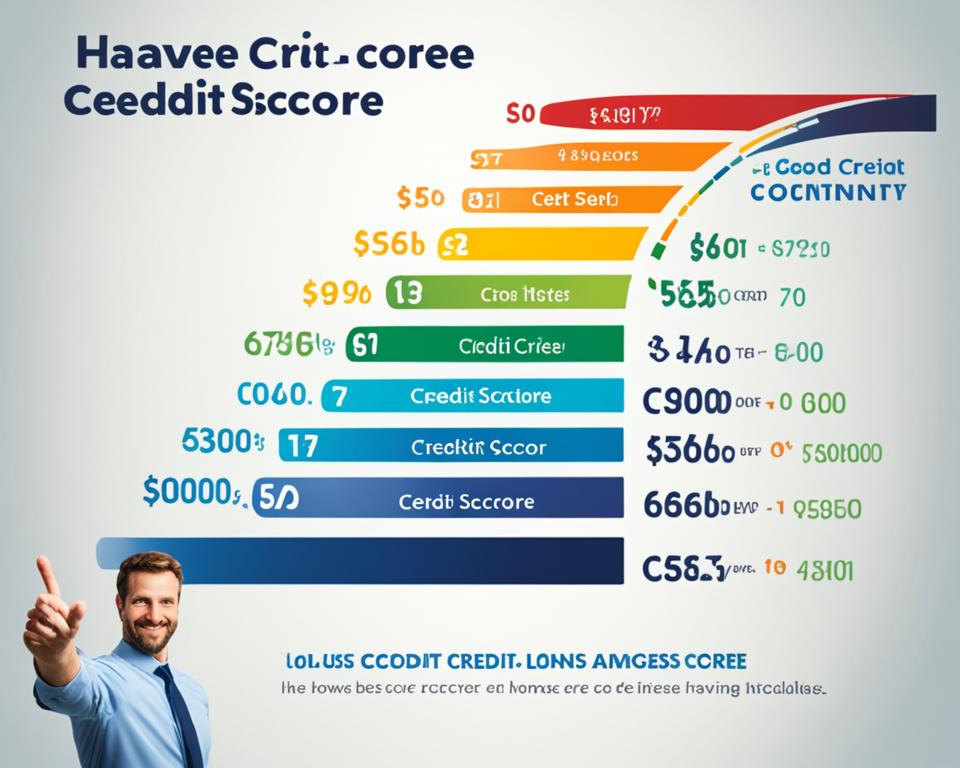Having a good credit score is crucial for your financial well-being. It can open doors to better borrowing opportunities, including lower interest rates and favorable loan terms. But what exactly qualifies as a good credit score? And how does it impact your borrowing power? In this guide, we’ll break down everything you need to know about credit scores and their ratings.
Key Takeaways:
- A good credit score is generally considered to be 700 or above on a range of 300-850.
- An excellent credit score is 800 or above.
- Most consumers fall between 600-750.
- Credit scores play a significant role in lending decisions and can impact your chances of loan approval.
- Regularly monitoring and improving your credit scores can lead to long-term financial success.
What Is a Good FICO Score?
When it comes to assessing your creditworthiness, FICO scores play a crucial role. But what exactly is considered a good FICO score? Let’s dive into the details.
A good FICO score typically falls within the range of 670-739 on a scale of 300 to 850. This indicates that you have a solid credit standing and are likely to be approved for credit applications with favorable terms.
FICO, the Fair Isaac Corporation, is the most widely used credit scoring model in the United States. It takes into account various factors such as payment history, credit utilization, length of credit history, types of accounts, and new credit inquiries. By combining these factors, FICO generates a comprehensive credit score that lenders and creditors use to assess your creditworthiness.
It’s important to note that FICO also creates different types of consumer credit scores tailored to specific industries. For example, credit card issuers may use a specific FICO Score version, while auto lenders may rely on another. However, the industry-specific FICO Score range for a good credit rating aligns with the general range of 670-739.
Why Does a Good FICO Score Matter?
Your FICO score can impact various aspects of your financial life. Here are a few reasons why having a good FICO score is important:
- Loan and Credit Card Eligibility: Lenders are more likely to approve your loan and credit card applications if you have a good FICO score. A higher score demonstrates your creditworthiness and reduces the perceived risk for lenders.
- Interest Rates: Having a good FICO score can help you secure lower interest rates on loans and credit cards. This translates into substantial savings over time, as you pay less in interest charges.
- Access to Higher Credit Limits: With a good FICO score, you may have access to higher credit limits. This provides you with greater borrowing power and financial flexibility.
- Insurance Premiums: Some insurance companies consider credit scores when determining insurance premiums. A good FICO score can result in lower insurance rates.
Understanding what constitutes a good FICO score is essential for managing your credit effectively and accessing favorable financial opportunities. Maintaining a good FICO score involves responsible credit usage, timely payments, and keeping your debt levels in check.
Remember, you can obtain a free copy of your credit report once every 12 months from each of the three major credit bureaus—Equifax, Experian, and TransUnion. Regularly monitoring your credit report allows you to spot and address any errors or inconsistencies that may impact your FICO score.
| FICO Score Range | Credit Rating |
|---|---|
| 300-579 | Poor |
| 580-669 | Fair |
| 670-739 | Good |
| 740-799 | Very Good |
| 800 and above | Exceptional |
What Is a Good VantageScore?
VantageScore is another widely used credit scoring model that provides consumers with valuable insights into their creditworthiness. When it comes to understanding your credit score rating, it’s essential to know what constitutes a good VantageScore and how it compares to other credit scoring systems.
A good VantageScore is generally considered to be in the range of 661-780 on a scale of 300 to 850. This range signifies a solid credit score rating that demonstrates responsible credit management and financial stability.
Like FICO Scores, VantageScore uses the same 300-850 scale, ensuring consistency and comparability across different scoring models. VantageScore 3.0 and 4.0 are the two most commonly used versions and share this range with the base FICO Scores.
| VantageScore Range | Credit Score Rating |
|---|---|
| 300-600 | Poor |
| 601-660 | Near Prime |
| 661-780 | Good |
| 781-850 | Superprime |
A good VantageScore places you in a favorable position when applying for credit cards, loans, or other financial products. Lenders view individuals with good credit scores as less risky, leading to better loan terms, lower interest rates, and increased borrowing power.
Image: 
What Is a Good Credit Score for a Mortgage?
When it comes to applying for a mortgage, having a good credit score can significantly impact your chances of approval and the interest rate you receive. A good credit score for a mortgage is generally considered to be 670 or higher. This shows lenders that you have a strong history of managing your credit responsibly and are likely to make timely mortgage payments.
Table: Minimum Credit Score Requirements for Different Mortgage Types
| Mortgage Type | Minimum Credit Score |
|---|---|
| Conventional Mortgage | 620 |
| FHA Loan | 500 with 10% down payment or 580 with 3.5% down payment |
| USDA Loan | 640 |
| VA Loan | 620 |
Most lenders require a minimum credit score of 620 for conventional mortgages. However, it’s important to note that each lender may have their own specific requirements. FHA loans, backed by the Federal Housing Administration, have more flexible credit score requirements. They may accept a credit score of at least 500 with a 10% down payment or a score of 580 with a 3.5% down payment. USDA loans, designed for rural and suburban homebuyers, typically require a minimum credit score of 640. VA loans, available to eligible veterans and active-duty military personnel, usually require a credit score of 620.
It’s essential to keep in mind that while credit score is an important factor, lenders also consider other aspects of your financial profile, such as income, employment history, and debt-to-income ratio. Meeting the minimum credit score requirement is not a guarantee of loan approval, as each lender has its own set of mortgage loan requirements.
By aiming for a good credit score, you increase your chances of securing a mortgage with favorable terms and lower interest rates. It’s advisable to review your credit report regularly, address any errors or problems, and take steps to improve your credit score if necessary. Building and maintaining good credit not only helps you qualify for a mortgage but also improves your overall financial health.
What Is a Good Credit Score to Buy a Car?
When it comes to buying a car, having a good credit score can make a significant difference in your financing options. While there isn’t a set minimum credit score required to buy a car, aiming for a credit score of 670 or higher puts you in the good credit range.
Having a good credit score increases your chances of securing better auto loan terms, including lower interest rates. Lenders consider individuals with good credit scores to be less risky borrowers, making them eligible for more favorable loan terms. Lower interest rates translate into lower monthly payments and potentially substantial savings over the life of the loan.
Importance of a Good Credit Score
A good credit score not only opens up opportunities for better loan terms and interest rates, but it also demonstrates your financial responsibility and ability to manage credit. Lenders use credit scores as a measure of creditworthiness when evaluating loan applications. A higher credit score gives lenders confidence in your ability to repay the loan on time, increasing the likelihood of loan approval.
“Aiming for a credit score of 670 or higher puts you in the good credit range.”
With a good credit score, you may also have access to special promotional offers from car manufacturers. These offers can include lower interest rates, discounted prices, or even cashback incentives. These perks can provide additional savings and improve your overall car-buying experience.
Auto Loan Terms and Interest Rates
Auto loan terms determine the duration of your loan and the number of monthly payments. A good credit score gives you access to favorable auto loan terms, allowing you to choose a loan that suits your budget and financial goals. Common auto loan terms range from 36 to 72 months.
Interest rates, also known as annual percentage rates (APR), play a crucial role in the cost of borrowing. Lenders use credit scores to gauge the risk of lending money to individuals, and those with higher credit scores enjoy lower interest rates. By maintaining a good credit score, you can secure a lower interest rate, resulting in lower monthly payments and significant savings over time.
It’s essential to compare offers from different lenders to find the best auto loan terms and interest rates. Keep in mind that interest rates can vary based on factors such as loan amount, loan term, and your financial history. Investing time in improving your credit score before applying for a car loan can lead to substantial long-term savings.
Factors That Affect Your Credit Scores
Understanding the factors that impact your credit scores is essential for managing your financial well-being. Several key elements contribute to determining your creditworthiness and overall credit score. By familiarizing yourself with these factors, you can make informed decisions to improve your credit standing.
Payment History
Your payment history plays a crucial role in determining your credit scores. Lenders want to see a track record of responsible financial behavior, such as consistently making on-time payments. Late payments or missed payments can negatively impact your credit scores and indicate a higher risk for future lenders.
Credit Usage
Another significant factor affecting your credit scores is your credit utilization rate, which is the percentage of your available credit you are currently using. To maintain a good credit score, it’s advisable to keep your credit utilization below 30%. High credit utilization suggests a reliance on credit and may raise concerns for lenders.
Length of Credit History
The length of your credit history also factors into your credit scores. Lenders prefer to see a longer credit history with a demonstrated ability to responsibly manage credit over time. This factor can be challenging for individuals with limited credit history, but responsible credit usage and consistent payments can help build a positive credit history over time.
Types of Accounts
The variety of credit accounts you have also impacts your credit scores. A healthy mix of credit accounts, such as credit cards, loans, and mortgages, shows that you can handle different types of credit responsibly. This factor demonstrates your ability to manage multiple financial obligations and can positively influence your credit scores.
Recent Activity
Finally, recent credit activity can affect your credit scores as well. Opening or closing multiple credit accounts within a short period may raise concerns for lenders. Additionally, excessive credit inquiries can indicate a higher risk of taking on too much debt. It’s important to be mindful of your credit activity and avoid unnecessary inquiries or actions that could negatively impact your credit scores.

By considering these various factors, including payment history, credit usage, length of credit history, types of accounts, and recent activity, you can gain a better understanding of how your financial decisions impact your credit scores. Taking proactive steps to improve in these areas can lead to better credit opportunities, lower interest rates, and increased financial stability.
“Understanding the factors that affect your credit scores is crucial for managing your financial well-being.”
How to Improve Your Credit Scores
If you’re looking to improve your credit scores, there are several key strategies you can implement. By focusing on these credit-building tips and understanding the factors that influence your credit score, you can take proactive steps towards improving your financial health.
Pay Bills on Time
One of the most crucial factors in improving your credit scores is consistently paying your bills on time. Late or missed payments can have a significant negative impact on your credit rating. Set up automated reminders or payment schedules to ensure you never miss a payment.
Keep Credit Card Balances Low
The amount of credit you’re utilizing, also known as your credit card balances, plays a major role in your credit scores. Aim to keep your credit card balances as low as possible, ideally below 30% of your available credit limit. By doing so, you demonstrate responsible credit management.
Maintain a Mix of Credit Accounts
Having a diverse mix of credit accounts, such as credit cards, loans, and mortgages, can also positively impact your credit scores. Lenders often look for a well-rounded credit history when assessing creditworthiness. Consider responsibly managing various types of credit to showcase your ability to handle different financial obligations.
Avoid Applying for Multiple Credit Accounts
While it may be tempting to apply for multiple credit accounts simultaneously, doing so can actually harm your credit scores. Lenders perceive multiple credit applications within a short period as a potential sign of financial instability. It’s best to apply for credit sparingly and only when necessary.
Regularly Check Your Credit Reports
Monitoring your credit reports is crucial for identifying and addressing any inaccuracies or discrepancies. Obtain free copies of your credit reports from all three major credit bureaus — Experian, Equifax, and TransUnion. Review your reports for errors, such as incorrect personal information or fraudulent accounts, and dispute them promptly.
Dispute Inaccuracies
If you encounter any inaccuracies on your credit reports, it’s essential to take immediate action. Dispute the inaccuracies with the respective credit bureaus to have them investigated and potentially removed from your reports. Correcting errors can improve your credit scores and prevent future negative consequences.
By implementing these credit-building strategies and actively managing your credit, you can work towards improving your credit scores over time. Remember, improving your credit takes time and requires consistent effort. Stay committed to responsible credit habits, and you’ll see positive changes in your financial profile.
Understanding Credit Score Ranges
When it comes to credit scores, understanding the ranges is key to evaluating your financial standing. Credit score ranges can vary depending on the scoring model used, whether it’s the widely-known FICO score or the VantageScore. Let’s take a closer look at these two popular credit scoring systems.
FICO Score Ranges
The FICO score, developed by the Fair Isaac Corporation, is one of the most widely used credit scoring models. It categorizes credit scores into several ranges:
- Poor: Scores below 580
- Fair: Scores between 580 and 669
- Good: Scores between 670 and 739
- Very Good: Scores between 740 and 799
- Exceptional: Scores 800 and above
A higher credit score within the FICO range indicates greater creditworthiness. Lenders often consider individuals with higher FICO scores as less risky borrowers, potentially leading to better loan terms and lower interest rates.
VantageScore Ranges
The VantageScore, developed by the three major credit bureaus (Experian, Equifax, and TransUnion), is another commonly used credit scoring model. VantageScores are categorized into the following ranges:
- Subprime: Scores between 300 and 600
- Near Prime: Scores between 601 and 660
- Prime: Scores between 661 and 780
- Superprime: Scores between 781 and 850
Similar to FICO scores, a higher VantageScore indicates better creditworthiness. Lenders often use VantageScores as a factor in lending decisions, determining interest rates and loan eligibility based on these credit score ranges.
Understanding credit score ranges can empower you to take charge of your financial well-being. By maintaining a good credit score, you can unlock attractive borrowing opportunities and enjoy more favorable terms from lenders.

| Scoring Model | Poor | Fair | Good | Very Good | Exceptional |
|---|---|---|---|---|---|
| FICO Score | Below 580 | 580-669 | 670-739 | 740-799 | 800 and above |
| VantageScore | 300-600 | 601-660 | 661-780 | 781-850 | N/A |
Why Credit Scores Differ Between Models
Credit scores can vary between different scoring models due to the various factors influencing their calculation. Different companies create these scoring models, and they may employ slightly different algorithms and weighting criteria. Additionally, the reporting practices of lenders also contribute to score variations.
When it comes to credit scoring models, two prominent names stand out: FICO and VantageScore.
FICO is the most widely used credit scoring model, with its FICO Score being the industry standard. It is used by the majority of lenders to assess creditworthiness. On the other hand, VantageScore is a credit scoring model developed jointly by the three major credit bureaus: Experian, Equifax, and TransUnion.
Both FICO and VantageScore have their unique methodologies for determining credit scores, leading to potential differences in the scores generated.
FICO is the most widely used credit scoring model, with its FICO Score being the industry standard. On the other hand, VantageScore is a credit scoring model developed jointly by the three major credit bureaus: Experian, Equifax, and TransUnion.
One notable distinction is the credit score ranges used by FICO and VantageScore. While FICO Scores range from 300 to 850, VantageScores also follow the same range. However, the way each scoring model categorizes credit scores within that range may differ slightly.
Credit Score Variations:
Another reason for credit score variations is the reporting practices of lenders. Not all lenders report information to all three credit bureaus. Some may report to only one or two bureaus, while others report to all three. As a result, the credit data available to each scoring model may differ, leading to score variations.
The Impact of Credit Score Variations
Credit score variations can have significant implications for individuals seeking credit. Lenders may prioritize one credit scoring model over another or place different weight on certain aspects of credit history. This means that a score considered excellent in one model may be viewed differently in another, affecting an individual’s eligibility for loans, interest rates offered, and overall creditworthiness.
Understanding the reasons behind credit score variations can help consumers appreciate the nuances of credit scoring models and make informed decisions regarding their credit.
What Credit Scores Do Not Consider
Credit scores are essential indicators of an individual’s creditworthiness, but they do not take into account various non-credit factors that can influence a person’s financial situation and ability to repay loans. Understanding what credit scores do not consider helps provide a more comprehensive view of an individual’s overall financial health and creditworthiness.
Credit scores do not consider demographic information such as race, color, religion, national origin, sex, or marital status. These factors are protected by laws and regulations to prevent discrimination in lending practices.
They also do not consider factors like age, salary, occupation, or where you live. Although these factors can indirectly affect an individual’s financial situation, they are not directly included in credit scoring models.
It is important to note that credit scores are primarily focused on an individual’s credit history, payment behavior, and credit utilization. By excluding certain non-credit factors, credit scores aim to provide an objective assessment of an individual’s creditworthiness based on their credit-related activities.
However, lenders may consider additional factors and conduct a more comprehensive evaluation when making lending decisions. These factors can vary depending on the lender and the type of loan being applied for.
Why Non-Credit Factors Are Not Considered
The exclusion of non-credit factors from credit scores is primarily to ensure fair and unbiased lending practices. By omitting information such as race, gender, or age, credit scores prevent discriminatory practices and promote equal access to credit for all individuals.
Lenders focus on credit-related factors that are statistically proven to be highly predictive of an individual’s creditworthiness. This approach helps mitigate the potential for bias or subjective judgments when evaluating loan applications.
The Relevance of Non-Credit Factors
While non-credit factors are not formally included in credit scores, they can still indirectly affect an individual’s financial situation and loan eligibility. For example, variables such as income, employment stability, and location can impact repayment capacity.
Even though credit scores do not directly consider these factors, lenders can still take them into account during the loan application process. Lenders may request additional documentation or consider other metrics to assess an individual’s ability to repay a loan.
It’s important for individuals to be aware of both their credit scores and the non-credit factors that can affect their financial well-being. Maintaining a stable income, managing expenses, and building a strong credit history can contribute to overall financial health and increase the likelihood of obtaining favorable loan terms.
How Credit Scores Impact Lending Decisions
Credit scores play a significant role in lending decisions. Lenders use credit scores to assess an individual’s creditworthiness and determine the likelihood of repaying borrowed money. A higher credit score can lead to more favorable loan terms and higher chances of approval.
“Credit scores provide lenders with a quick snapshot of a borrower’s creditworthiness. It helps them evaluate the risk associated with lending money.”
When evaluating loan applications, lenders consider various loan approval criteria, and credit scores are one of the key factors. A higher credit score indicates a history of responsible financial behavior and prompt repayment, making the borrower less risky in the eyes of the lender.
With a good credit score, individuals may qualify for lower interest rates, better loan terms, and higher borrowing limits. On the other hand, lower credit scores can result in higher interest rates, stricter loan terms, or even loan denial.
The Role of Credit Scores
Credit scores give lenders an indication of how well an individual manages credit and handles financial obligations. They provide lenders with the confidence to make lending decisions based on the borrower’s creditworthiness.
When reviewing loan applications, lenders typically set minimum credit score requirements. Meeting or exceeding these requirements increases the likelihood of loan approval. However, it’s important to note that credit scores are just one piece of the puzzle. Lenders also consider other factors such as income, employment history, and debt-to-income ratio.
Benefits of a Higher Credit Score
- Access to lower interest rates: A higher credit score can qualify individuals for loans with lower interest rates, potentially saving them thousands of dollars over the life of the loan.
- Increased borrowing power: With a good credit score, individuals may qualify for larger loan amounts, giving them the flexibility to make significant purchases or investments.
- Improved chances of loan approval: Lenders are more likely to approve loan applications from individuals with high credit scores, as they are seen as lower-risk borrowers.
- More favorable loan terms: Borrowers with good credit often enjoy better repayment terms, including longer loan tenures and flexible repayment options.
By maintaining a strong credit score, individuals can enhance their financial standing and increase their options when it comes to borrowing money for various purposes.
To summarize, credit scores have a significant impact on lending decisions. They serve as a measure of creditworthiness, influencing the loan terms and conditions offered by lenders. Maintaining a good credit score is essential for securing favorable borrowing opportunities and achieving long-term financial success.
Tips for Building and Monitoring Credit
Building and monitoring credit are essential for maintaining a healthy financial profile. By following these credit-building tips and establishing effective credit monitoring habits, you can take control of your credit journey and pave the way for a brighter financial future.
Building Credit
When it comes to building credit, consistency is key. It’s important to establish a positive credit history by:
- Making on-time payments: Pay your bills on time to demonstrate your financial responsibility.
- Keeping credit card balances low: Aim to use no more than 30% of your available credit to maintain a healthy credit utilization ratio.
- Maintaining a mix of credit accounts: Having a diverse mix of credit accounts, such as credit cards, loans, and mortgages, can show lenders that you can responsibly manage different types of credit.
By incorporating these practices into your financial routine, you can gradually build a solid credit foundation.
Monitoring Credit
Monitoring your credit is crucial for staying informed about your credit health and safeguarding yourself against fraud or errors. Here are some important steps to effectively monitor your credit:
- Regularly checking credit reports: Obtain free credit reports from each of the three major credit bureaus (Equifax, Experian, and TransUnion) annually or at least once every four months to review the information listed and identify any discrepancies.
- Disputing inaccuracies: If you notice any errors on your credit reports, take prompt action by disputing them with the respective credit bureaus to ensure the information is corrected.
- Freezing credit: Consider placing a credit freeze on your credit reports to add an extra layer of protection against unauthorized access and potential identity theft.
By actively monitoring your credit, you can stay vigilant and address any issues or inaccuracies that may arise.

Remember, building credit is a gradual process, and it requires patience and discipline. By implementing these credit-building tips and maintaining regular credit monitoring practices, you can proactively manage your credit and set yourself up for financial success in the long run.
The Importance of Good Credit Scores
Good credit scores play a significant role in your financial well-being. They are not just numbers; they can open doors to better borrowing opportunities and provide you with more financial flexibility. Lenders view individuals with good credit scores as lower-risk borrowers, making them more likely to offer favorable financing options. Let’s explore why having a good credit score is so important.
Borrowing Power
Having a good credit score gives you greater borrowing power. It means you have demonstrated responsible credit behavior and are seen as a reliable borrower. This can translate into being approved for higher credit limits on credit cards or qualifying for larger loans, such as a mortgage or car loan, which can be immensely helpful when making significant purchases or investments.
“With a good credit score, you have the power to access the credit you need to achieve your financial goals.”
Whether you’re applying for a personal loan, a business loan, or a line of credit, a good credit score can make the difference between securing the funds you need or being denied. It’s a vital factor that lenders consider when evaluating your creditworthiness and willingness to repay the borrowed money.
Lower Interest Rates
One of the key benefits of having a good credit score is the ability to secure loans and credit cards with lower interest rates. Lenders reward borrowers with good credit by offering them more favorable terms, such as lower interest rates and fees.
When you have a higher credit score, lenders see you as less of a risk and are more confident in your ability to repay any borrowed funds. This increased confidence can result in lower interest rates, saving you money over time. Whether you’re applying for a mortgage, auto loan, or personal loan, a lower interest rate can make a significant difference in the total amount you’ll pay back.
Financial Opportunities
Having a good credit score opens up a world of financial opportunities. With a good credit history, you can enjoy the freedom to choose from various credit card offers, access better rewards programs, and take advantage of promotional deals and discounts. It also enables you to qualify for favorable loan terms, making it easier to achieve your goals, whether that’s buying a house, starting a business, or pursuing higher education.
Beyond borrowing, good credit can positively impact other areas of your financial life. Landlords may view you as a more reliable tenant, and some employers even consider credit history during the hiring process. A good credit score can also lead to lower insurance premiums, as insurers often use credit information to assess risk.
Overall, having a good credit score is a valuable asset that can provide you with greater financial opportunities, lower interest rates, and the ability to borrow on more favorable terms. By maintaining good credit habits and making responsible financial decisions, you can build and maintain a strong credit profile that will benefit you for years to come.
The Role of Credit Scores in Buying a House
When it comes to buying a house, credit scores play a crucial role in determining your loan eligibility and mortgage interest rates. Lenders rely on credit scores to assess the likelihood of borrowers repaying their loans on time and use this information to make informed decisions about loan approval and terms. Understanding the importance of credit scores in homebuying is key to securing the best possible financing options for your dream home.
A higher credit score can significantly impact your homebuying experience. Here’s how:
- Lower Mortgage Interest Rates: A higher credit score often translates to lower mortgage interest rates. Lenders view borrowers with good or excellent credit as less risky and reward them with more favorable rates. This means that borrowers with higher credit scores can save thousands of dollars over the life of their mortgage through reduced interest payments.
- Improved Loan Terms: In addition to lower interest rates, a higher credit score can also lead to better loan terms. Lenders may be more willing to extend favorable loan terms, such as longer repayment periods or lower down payment requirements, to borrowers with strong credit scores. This can make homeownership more affordable and accessible.
- Increased Chances of Loan Approval: Lenders consider credit scores as one of the primary indicators of a borrower’s creditworthiness. A higher credit score demonstrates a history of responsible financial behavior and makes lenders more confident in approving your loan application. With a good credit score, you can significantly increase your chances of securing a mortgage.
Types of Mortgages and Credit Score Requirements
It’s important to note that different types of mortgages have varying credit score requirements. While conventional mortgages typically require a minimum credit score of 620, government-backed loans like FHA loans may consider borrowers with credit scores as low as 500, albeit with additional down payment requirements. Here’s a breakdown of credit score requirements for different types of mortgages:
| Type of Mortgage | Minimum Credit Score Requirement |
|---|---|
| Conventional Mortgage | 620+ |
| FHA Loan | 500-579 (with 10% down payment) 580+ (with 3.5% down payment) |
| USDA Loan | 640+ |
| VA Loan | No set minimum score, but lenders typically prefer 620+ |
These credit score requirements serve as guidelines, and lenders may also consider other factors when evaluating loan applications. It’s essential to work with a knowledgeable mortgage lender who can guide you through the process and provide personalized advice based on your unique financial situation.
Overall, credit scores play a substantial role in the homebuying process. Aim to build and maintain a good credit score to unlock more favorable mortgage options, lower interest rates, and increase the likelihood of loan approval. Regularly monitoring your credit scores, addressing any inaccuracies, and responsibly managing your finances can help you achieve your homeownership goals.
Conclusion
Understanding credit scores is crucial for effectively managing personal finances and making informed borrowing decisions. A good credit score opens the doors to better borrowing opportunities and contributes to financial stability. By regularly monitoring and actively working to improve credit scores, individuals can pave the way for long-term financial success.
With a comprehensive credit score guide and a solid understanding of credit ratings, individuals can navigate the complex world of credit with confidence. By knowing their creditworthiness, they can approach lenders with a clear picture of their financial capabilities.
By taking steps to maintain a good credit score, individuals increase their chances of being approved for loans, credit cards, and mortgages. Not only does a good score increase borrowing power, but it can also secure better interest rates and terms, ultimately saving money in the long run.
Regularly accessing free credit reports, monitoring credit activity, and understanding the factors that impact credit scores are essential practices for anyone seeking financial stability and growth. Armed with knowledge and a proactive approach, individuals can ensure their credit rating works in their favor and supports their financial goals.
FAQ
What is a good credit score?
A good credit score is generally considered to be 700 or above on a range of 300-850. Most consumers fall between 600-750. The average FICO Score in the US is 714 in 2022.
What is a good FICO score?
A good FICO score is typically between 670-739 on a scale of 300 to 850.
What is a good VantageScore?
VantageScore’s good credit score range is generally considered to be 661-780 on a scale of 300 to 850.
What is a good credit score for a mortgage?
To increase your chances of approval and qualify for a lower-rate mortgage, it’s best to have a credit score in the good range, which is 670 or higher. The minimum credit score required to buy a house can vary, but most lenders typically require a minimum score of 620 for conventional mortgages.
What is a good credit score to buy a car?
While there isn’t a set minimum credit score to buy a car, aiming for a credit score of 670 or higher puts you in the good credit range. A higher credit score can help you qualify for better auto loan terms, including lower interest rates.
What factors affect credit scores?
Several factors impact credit scores, including payment history, credit usage, length of credit history, types of accounts, and recent activity. Payment history and credit usage have the most significant impact on credit scores.
How can I improve my credit scores?
To improve your credit scores, focus on paying bills on time, keeping credit card balances low, maintaining a mix of credit accounts, and avoiding applying for multiple credit accounts in a short period. Regularly checking your credit reports and disputing any inaccuracies can also help improve your scores.
What are the credit score ranges?
Credit score ranges can vary depending on the scoring model. FICO score ranges are generally categorized as poor, fair, good, very good, and exceptional. VantageScore ranges include subprime, near prime, prime, and superprime.
Why do credit scores differ between models?
Credit scores can differ between models because different companies create the scoring models, and they may use slightly different algorithms and weighting criteria. Additionally, not all lenders report to all three credit bureaus, which can also lead to score variations.
What factors do credit scores not consider?
Credit scores do not consider demographic information such as race, color, religion, national origin, sex, or marital status. They also do not consider factors like age, salary, occupation, or where you live.
How do credit scores impact lending decisions?
Credit scores play a significant role in lending decisions. Lenders use credit scores to assess an individual’s creditworthiness and determine the likelihood of repaying borrowed money. A higher credit score can lead to more favorable terms and higher chances of approval.
What are tips for building and monitoring credit?
Building credit involves making on-time payments, keeping credit card balances low, and maintaining a mix of credit accounts. Monitoring credit includes regularly checking credit reports for errors, disputing inaccuracies, and freezing credit to protect against fraud.
Why are good credit scores important?
Good credit scores are important because they can help you qualify for credit cards and loans with lower interest rates and better terms. Lenders view individuals with good credit scores as lower-risk borrowers, making them more likely to offer favorable financing options.
How do credit scores impact buying a house?
Credit scores are crucial when buying a house. Higher credit scores can lead to lower mortgage interest rates, better loan terms, and increased chances of loan approval. Different types of mortgages have varying credit score requirements.
What is the role of credit scores in borrowing and finances?
Understanding credit scores is essential for managing personal finances and making informed borrowing decisions. Good credit scores can unlock better borrowing opportunities and contribute to financial stability. Regularly monitoring and improving credit scores can lead to long-term financial success.





